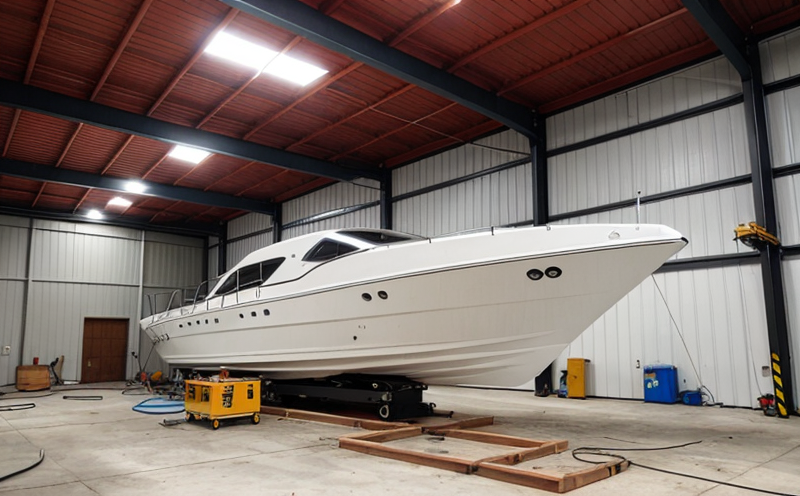ASTM D792 Density Testing of FRP Hull Components
The ASTM D792 standard provides a method for determining the apparent density of fiber-reinforced plastic (FRP) materials, which are widely used in marine and ship equipment manufacturing. This testing is critical to ensure that hull components meet the required specifications regarding strength, durability, and integrity.
ASTM D792 tests involve measuring the mass of a known volume of the material at various points on the FRP component. The apparatus typically includes an analytical balance for precise mass measurement and a graduated cylinder or displacement canister for volumetric determination. This method is particularly important in marine applications where hull integrity must withstand harsh conditions, including saltwater exposure and mechanical stress.
The process begins with careful preparation of test specimens from the FRP hull component. Specimens are cut to ensure they are representative of the material's properties across different sections of the hull. Once prepared, these samples undergo density testing according to ASTM D792 procedures:
- Mass measurement using a high-precision balance.
- Determination of volume by immersion method or displacement technique in a graduated cylinder.
- Calculation of apparent density as mass divided by volume.
The results are then compared against specified acceptance criteria to ensure the hull components meet the required standards. This testing ensures that all parts contribute effectively to the overall structural integrity and longevity of the vessel.
ASTM D792 is just one part of a comprehensive quality assurance program for FRP hull components in marine applications. By adhering to this standard, manufacturers can verify compliance with industry requirements while also enhancing confidence among end-users regarding product performance.
| Industry Applications |
|---|
| - Ensuring the structural integrity of FRP hull components in marine and ship equipment manufacturing. |
| - Verifying compliance with international standards for material properties. |
| - Supporting ongoing research into improved FRP formulations and manufacturing processes. |
By using ASTM D792 density testing, quality managers can ensure that each hull component meets the highest standards of performance and reliability. This is crucial for maintaining safety at sea and extending the operational life of vessels.
Industry Applications
The results of ASTM D792 density testing are particularly valuable for:
- Evaluating the quality and consistency of FRP hull components used in various types of vessels, including yachts, commercial ships, and naval craft.
- Ensuring compliance with international standards such as ISO 14065 for marine equipment.
- Supporting research into new composite materials and manufacturing techniques to improve the performance and longevity of FRP hulls.
Eurolab Advantages
With extensive experience in ASTM D792 density testing, Eurolab offers several advantages:
- Highly trained technicians using advanced equipment to ensure precise and accurate results.
- Dedicated support teams available for consultation on test procedures and interpretation of results.
- Comprehensive reporting services that include detailed analysis and recommendations based on test outcomes.
Eurolab's commitment to quality and reliability is unmatched, ensuring that all hull components meet the highest international standards.
Quality and Reliability Assurance
To ensure the reliability of ASTM D792 results:
- Careful preparation of test specimens is crucial to representative sample collection.
- Consistent use of standardized equipment and procedures minimizes variability in testing outcomes.
- Detailed reporting that includes both numerical data and graphical representations for easy interpretation by stakeholders.
These measures contribute significantly to maintaining high standards across the entire production process, thereby enhancing overall product quality and reliability.





